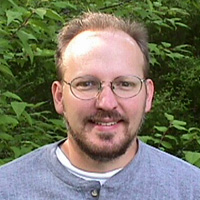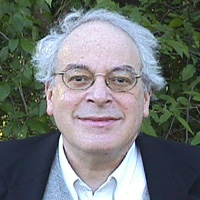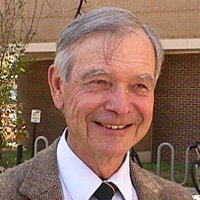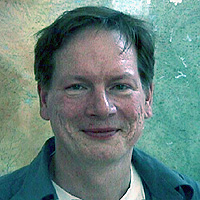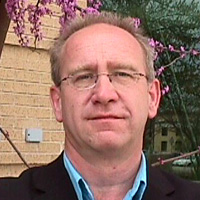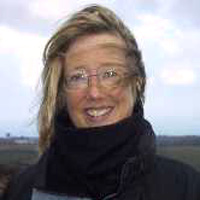 |
Kate Rawles (Free-Lance Lecturer and Consultant), November 20, 2003, EESAT 125, 7:30 pm - 9:00 pm Outdoor environmental philosophy is an attempt to integrate the best of "indoor" environmental philosophy with emotionally engaged experiences of the wilder, nonhuman world. Rawles' aim is to create short courses that explore the nature of environmental value and of our ethical relationships with the environment, and with nonhuman animals, in ways that are both intellectually rigorous and emotionally connected; and that will inspire an ongoing, practical commitment to environmental sustainability long after the course has ended. She discusses the key components of her outdoor environmental philosophy as it has developed so far, and considers some of the assumptions it rests on-- for example, about the role of emotion and experience in ethical deliberation. Rawles was a lecturer in environmental philosophy at Lancaster University in the United Kingdom for 10 years, specializing in environmental ethics, ethical issues in sustainable development, and animal welfare. She left Lancaster in January 2000 to pursue these practical aims further and now works entirely free-lance as a lecturer and consultant. Current projects include working with Nirex UK on ethical issues in radioactive waste management and as academic director of Forum for the Future's innovative "Reconnections" project--a five day course for national and international business people, exploring the values base of sustainable development. She has recently received a major grant from NESTA (National Endowment for Science, Technology and the Arts) to develop "Outdoor Environmental Philosophy"--courses which aim to explore the way we value the environ- ment by integrating intellectual analysis and debate with experience and emotion, taking people whose working lives affect the environment into relatively wild places. |
|
Clare Palmer (Lancaster University), October 23, 2003, EESAT 125, 7: 30 pm - 9:00 pm Madness and Animality in Michel Foucault's Madness and Civilization Madness and Civilization is one of Michel Foucault's earliest but most well-known books, and contains his only extended discussion of animality. This lecture begins by outlining the basic thrust of the central arguments of Madness and Civilizatiilization. It then closely examines different understandings of animality, in relation to madness, discussed by Foucault in the course of the book. Foucault maintains that animality is understood in different ways in different historical eras. Without denying this, Palmer argues that scrutiny of Foucault's own account, and the accounts of animality he describes, indicates one constant--animality, like madness, is always seen as being fundamentally in opposition to reason. She raises a number of difficulties with the animality/reason dichotomy that Foucault ultimately seems to endorse, both in terms of the principle of the dichotomy itself, and in terms of the human-animal power relations that may flow from it. |
|
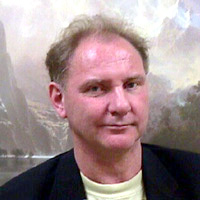 |
Jozef Keulartz (Wageningen University), April 25, 2003, EESAT 130, 3: 00 pm - 4: 00 pm |
|
Steve Windhager (Lady Bird Johnson Wildflower Center), April 11, 2003, EESAT 130, 3:00 pm - 4: 30 pm Alumni Appreciation Day Honoree: A Conversation with the Graduate Students |
|
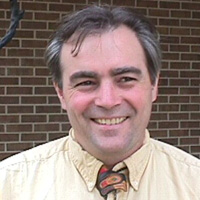 |
Murray Journeay (Natural Resources Canada), April 11, 2003, EESAT 130, 3: 00 pm - 4: 30 pm Navigating Pathways toward a Sustainable Future The Georgia Basin region of western Canada provides a context and focus in which to explore the integration and potential societal impact of place- based planning, scenario modeling and geosemantic web technologies. Quest (Envision Sustainability Tools, Inc.) and CommunityViz (Orton Family Foun- dation) are integrated assessment modeling and visualization tools that enable people from all walks of life to construct alternative futures for a region and evaluate the trade-offs and consequences of their choices. The Georgia Basin Digital Library (GBExplorer) is a web-based digital library/ semantic web application that provides a framework for integrating the results of these scenario-modeling tools to help promote a shared under- standing of regional sustainability. Together, these resources help promote a wider and deeper understanding of environmental, social and economic issues, and offer the potential for transforming the ways in which regional urban centres and surrounding rural communities use and share informa- tion to make decisions about their collective future. Murray is a geologist and informatics specialist with the Earth Science Sector of Natural Resources Canada. He is part of regional sustainability research initiative in the Georgia Basin region of western Canada www.basinfutures.net), and leads an interdisciplinary sustainability learning network project (www.georgiabasin.info) aimed at building a web-based architectural framework to situate and promote the use of integrated earth science information, knowledge and expertise within a broader societal context. His work focuses on geological hazards and groundwater management issues in western Canada, and on the development of integrated knowledge systems and semantic web applications to facilitate the understanding and uptake of earth science information in support of interdisciplinary research and decision making on issues of public safety, resource management and sustainable development. |
|
Mark Sagoff (Institute of Philosophy and Public Policy, University of Maryland), April 9, 2003, EESAT 130 This Side of the Phenomena: Kant and Ecology, 3:30 pm If Kant is right and we can do science in the context of universal determinism, nature has no order that ecologists can model or represent in mathematical terms. We can therefore pursue morality (policy) and aesthetics in the context of the possibility of human freedom and the ordering of nature at the level of things-in-themselves. To do so is to abandon science to investigate nature in the context of the moral sciences, including aesthetics and theology. What does Willingness to Pay Measure? Value in Use and Exchange, 7: 30 pm The amount people pay and are willing to pay for a good - its market price - may have little to do with the benefit or utility that good provides. The concept of total WTP, insofar as it is defined as equal to utility or benefit, cannot and need not be measured. As a rule, people do not know, care to know, or even think about their total WTP even for goods that are marketed; rather, they respond to prices that competition among suppliers drives down toward production costs. Attempts to measure total WTP are needless because efficient allocation depends only on prices set in a competitive market. Sagoff is a Pew Scholar in Conservation and the Environment and past President of the International Society of Environmental Ethics. Sagoff has published widely in journals of philosophy, law, economics, and public policy, including Amicus Journal, Atlantic Monthly, EPA Journal, Nature Conservancy, and Orion. His book, The Economy of the Earth: Philosophy, Law, and the Environment was published in 1988. He has also taught at Princeton University, the University of Wisconsin at Madison, and Cornell University. Sagoff has received major grants from several foundations, including the National Science Foundation, the National Endowment for the Humanities, and the Pew Charitable Trusts. |
|
|
|
Allan Savory (Center for Holistic Management), April 4, 2003, EESAT 130, 3:00 pm - 4:30 pm Toward a Brighter Future: Biodiversity through Holistic Management We are trivializing the concept of biodiversity at our peril. Only recently has it become accepted that over thousands of years many civilizations have been self- destructive by damaging biodiversity--something now facing global civilization. Savory will present reasons why one can be more optimistic about humanity's future than ever before in history. He will discuss ways that the general public and policy makers can start to move to a more hopeful future through structuring decision mak- ing processes on the level of families, businesses, com- munities, and governments. Savory is the founding director of the Center for Holistic Management in Albuquerque, New Mexico and the author of Holistic Management: A New Framework for Decision-Making (Island Press, 1999). He was a research biologist and game ranger in Northern Rhodesia (today Zam- bia), and a politician, international consultant, farmer and game rancher in Southern Rhodesia (today Zimbabwe). In the 1960s while working on the interrelated problems of increasing poverty and disappearing wild- life, he made a significant breakthrough in understanding what was causing the degradation and desertification of the world's grassland ecosystems. Exiled in 1979 as a result of his opposition to the ruling party, headed by Ian Smith, he emigrated to the United States where he co-founded the Center for Holistic Management. |
|
Gijs van Oenen (Erasmus University, Rotterdam), April 1, 2003, EESAT 110, 3: 30 pm - 5: 00 pm Globalizing Power and Testimonial Politics The state of the political, in our networked, globalizing world, is a state of concern. In particular, it seems increasingly difficult to articulate political counter-voices, against dominant views that are associated with the control over "globalizing" economic and cultural institutions or networks. In their re- cent and much-discussed book Empire, the philosophers Michael Hardt and Toni Negri conclude that our post-imperialist world (i.e., the United States and its political culture) no longer has any "outside," and that therefore criti- cal voices, arising from external perspectives, are irredeemably doomed; they are either overruled or assimilated into the system. I contest this assertion through an analysis of the political resilience of hybrid voices, that is to say, voices and speakers that "double cross" the border between inside and out- side, moving both within and without the dominant political and cultural sys- tem. I consider the Latin American genre of the testimonio as a prime example of such hybrid resilience. I conclude that finding political counter-voices im- plies finding new forms and practices of testimonio. Gijs van Oenen is professor of ethics, legal philosophy and social philosophy at the Department of Philosophy of Erasmus University, Rotterdam, The Netherlands. He holds a Ph.D. from the University of Amsterdam, where he taught at the Law School, the Department of Political Science, and the Department of Philosophy. He published a book on The Uses of Illegality, and an edited volume on the virtues of tolerance as the deliberate lax enforcement of law. His research interests include issues of identity formation, citizenship, the rule of law, and multiculturalism. |
|
|
|
René Boomkens (University of Groningen), March 25, 2003, EESAT 130, 3: 30 pm - 5:00 pm Since 1990 globalization has become the catch phrase used to describe and explain everything new in politics and culture. But what exactly does it describe and explain? The first years it predominantly referred to financial and economic liberalization on a global scale. Afterwards it was identified with the rapid success of electronic communication and the Internet. Nowadays it refers to globalized cultural and political connections and exchanges. Looking back at the debates about the meaning and direction of processes of globalization most of them seem to relate to questions of identity and culture, questions like local culture, denationalization and migration, like homogenization versus differentiation, and like global cultural conflict versus growing hybridity. The crucial problem in all these questions seems to be: who's in control? Better: is there someone in control? René Boomkens is professor of social and cultural philosophy at the University of Groningen, The Netherlands. From 1998 till 2002 he also was special professor of popular music at the University of Amsterdam. His research concerns the development of popular and mass culture, mass media, urban culture and development, globalization and contemporary philosophy, especially the work of Walter Benjamin, Hannah Arendt, the Frankfurt School, Richard Rorty and Michel Foucault. He published several books on topics like popular music, urban culture and development, fear in public life, and the philosophy of Rorty. He is editor of the Dutch journal of philosophy Krisis and of the monthly magazine on literature and culture De Gids. |
|
Gene Hargrove (University of North Texas), February 28, 2003, EESAT 130, 3: 00 pm - 4:30 pm On Environmental Value Education Most environmental laws contain lists of values that are supposed to be promoted in order to inhibit economic development without adequate environmental concern. Focusing on these values and teaching them from a traditional or heritage perspective could eliminate possible charges by political conservatives and the religious right that teachers are indoctrinating students into their own value systems or teaching value relativity. This approach can be called environmental citizenship (paralleling stewardship) and could provide a basis for promoting the values in our laws as originally intended, rather than by substituting inappropriate economic values. |
|
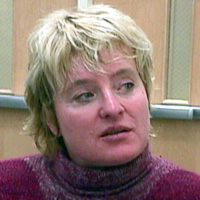 |
Teresa Kwiatkowska (Universidad Autonoma Metropolitana-Iztapalapa), February 21, 2003, EESAT 130, 3: 00 pm - 4: 30 pm Chance, Change, and Environmental Ethics Throughout the history humans have had a deep-seated preference for order and predictability. Yet, in nature the future is unpredictable and natural disturbances frequent. Environmental ethics (conservation) has often been based on ideas derived from outdated ecological models and ideas. To achieve our desired goals in conservation, we need an approach where change and chance are the rule, not an exception. Kwiatkowska was born in Poland and teaches in the Philosophy Department at Universidad Autonoma Metropolitana-Iztapalapa in Mexico. She is the author of various articles published in the US, Mexico, Poland, Australia, and Argentina. She has edited seven books in Mexico, including two textbooks on environmental ethics, and two books in Spain. She is the coauthor of Mundo Antiguo y Naturaleza (2001). |
|
David Taylor (University of North Texas), February 14, 2003, EESAT 130, 3: 00 pm - 4: 30 pm Language in the Landscape: Possibilities for Literature in Environmental Work Taylor will first discuss the history of the Association for the Study of Literature and environment and its work within academics, second, a community arts experiment in Spartanburg, South Carolina in raising awareness and encouraging public action for a local urban stream, Lawson's Fork Creek, and, third, the mixed legacy of Thoreau in American nature and place-based writing with some suggestions toward new storylines. Taylor has published scholarly and creative writing in such journals as Ecological
Restoration, Environmental History, Mountain Gazette, Terrain, Southern |
|

